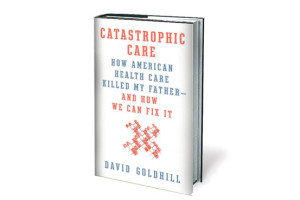 David Goldhill is a CEO. He likes Obama. He’s a democrat and generally supports government in healthcare.
David Goldhill is a CEO. He likes Obama. He’s a democrat and generally supports government in healthcare.
But it blows his mind that an entire industry is blind to prices.
After his dad died from a hospital-borne infection, Mr. Goldhill started a quest; improve healthcare in America.
His wrote “How American Healthcare Killed my Father” for the Atlantic.
He researched, debated and lectured on healthcare.
Then he wrote a book: Catastrophic Care: Why Everything We Think We Know about Health Care Is Wrong. Malcolm Gladwell calls it
“A devastating and utterly original analysis of what has gone wrong with the American health care system. Read it, and take a deep breath.”
Why bother with US healthcare?
Everyone knows Canadian Medicare is better…and different, right? Canadians love not being American.
But for healthcare, we share something critical: invisible costs. Patients and providers never know the price of care. Not that it’s not free; just too scary for us to know the real cost.
- In the US, insurance companies pay.
- In Canada, governments pay.
- Patients access care with no concern for cost.
- Doctors provide care with almost no concern for cost.
To this, the choir bursts into “O Canada!” And Canadian Doctors4Medicare enjoin with, “Hallelujah! Hallelujah!”
Catastrophic Care – Highlights
- Surrogates administer and pay for care. Third parties (insurance companies and governments) never care as much about prices as 1st and 2nd parties (patients and doctors).
- Medicare presents moral hazard – do extra work ‘because it’s covered’.
- “But if patients were served like customers, wouldn’t that create waste in advertising and promotion?“ Marx said the same about toilet paper; how wasteful to have more than 1 brand!
- Lower administrative costs do not indicate success. With waste, waiting and quality concerns, low admin costs indicate rationing or negligence.
- Insurance/government-run systems have no meaningful financial discipline.
- Cost based pricing never works. ‘Costs’ just get artificially raised.
- We’re fixated on insurance, static rules and unknown prices. We are overconfident in our ability to set prices.
- The healthcare system makes us feel like paupers – a result of a system without customer accountability.
- We follow a path of dependence. We limit reforms to existing structures.
- We try to cover too much. It’s dangerous to the whole system.
- Surrogates, regulators and special interest groups resist new ideas.
- Stakeholder interests control government’s agenda.
- Creative destruction becomes impossible; incumbents’ interests become stakeholders’ interests.
- Business eliminates whole industries to improve customer service (e.g. longshoremen disappeared with ‘container’ shipping).
- Governments never eliminate a stakeholder.
- Goldhill offers a thought experiment: Could we spend healthcare dollars differently? He leverages ideas from Singapore to offer a plan.
If you only read one healthcare book this year, try Catastrophic Care: Why Everything We Think We Know about Health Care Is Wrong. Mr. Goldhill writes well. Other than a few totally US-centric sections, Goldhill shares problems and solutions that apply to Canadian Medicare too. He does not promote a totally privatized, laissez faire, market-based system.
I’d love to hear what you think of it!
